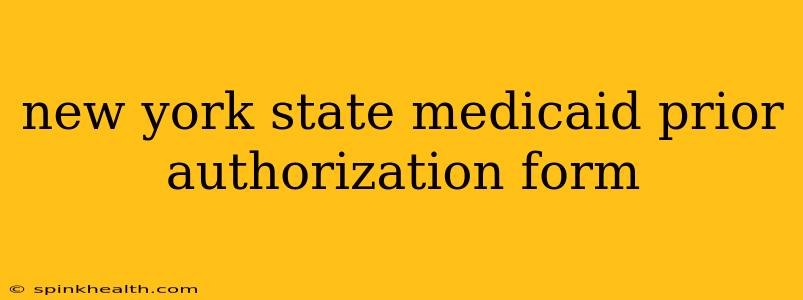Navigating the Maze: Your Guide to New York State Medicaid Prior Authorization
The process of obtaining prior authorization for medical services under New York State Medicaid can feel like navigating a labyrinth. It's filled with forms, requirements, and potential delays that can be frustrating for both patients and providers. But don't despair! This guide will illuminate the path, helping you understand the process and increasing your chances of a smooth and successful authorization.
Imagine this: Sarah, a New York resident on Medicaid, needs a specialized MRI scan. She’s already facing health challenges, and now she’s confronted with the paperwork hurdle of prior authorization. This isn’t just about filling out a form; it's about understanding the system and advocating for her own healthcare. Sarah’s story, though fictional, highlights the common anxieties many New Yorkers experience when dealing with Medicaid prior authorizations.
What is Prior Authorization for Medicaid in New York?
Prior authorization, often called pre-authorization, is a process where your doctor must get approval from your Medicaid health plan before you receive certain medical services or medications. This ensures that the treatment is medically necessary and cost-effective. Think of it as a gatekeeper, preventing unnecessary or inappropriate use of resources. While it can add a layer of complexity, it’s a critical component of managing the Medicaid program’s budget and ensuring its sustainability.
What types of services usually require prior authorization in NY Medicaid?
Many services require prior authorization under New York's Medicaid program. These often include, but aren't limited to:
- Specialized medical tests: Like Sarah's MRI, these often require pre-approval to ensure they are the most appropriate and cost-effective diagnostic tool.
- Certain medications: High-cost prescription drugs, particularly specialty medications, frequently require prior authorization.
- Durable medical equipment (DME): This could range from wheelchairs and oxygen concentrators to hospital beds.
- Inpatient hospital care: While not always the case, certain hospital stays might require pre-authorization depending on the nature of the treatment.
- Outpatient procedures: Specific procedures performed in a doctor's office or outpatient surgical center often need pre-approval.
Where can I find the New York State Medicaid prior authorization form?
There isn't one single "New York State Medicaid prior authorization form." The forms and processes vary depending on:
- Your specific Medicaid managed care plan: New York has several Medicaid managed care organizations (MCOs), each with its own processes and forms.
- The type of service: The form needed for medication will be different from the one required for durable medical equipment.
To obtain the correct form, you should contact your Medicaid managed care plan directly. Their customer service number should be on your Medicaid card or in your plan's welcome packet. Their website may also have information regarding prior authorization procedures and downloadable forms.
How long does the prior authorization process take?
The processing time for prior authorization varies greatly, depending on the complexity of the request and the specific MCO. While some requests might be processed within a few days, others can take weeks or even longer. Always submit your request well in advance of the needed service. Proactive planning is crucial here.
What happens if my prior authorization is denied?
If your prior authorization is denied, you have options. First, understand the reason for the denial. The MCO should provide an explanation. Then, you can:
- Appeal the decision: Most plans have an appeals process; carefully follow their guidelines.
- Request a peer-to-peer review: This involves your doctor speaking directly with the MCO's medical reviewer to discuss the case.
- Seek assistance from a patient advocate: If you're struggling to navigate the appeals process, consider seeking help from a patient advocacy group.
Navigating the New York State Medicaid prior authorization process can be challenging, but understanding the steps involved and knowing your rights empowers you to advocate for your healthcare effectively. Remember, proactive communication with your doctor and your Medicaid MCO is key to a smoother experience.

